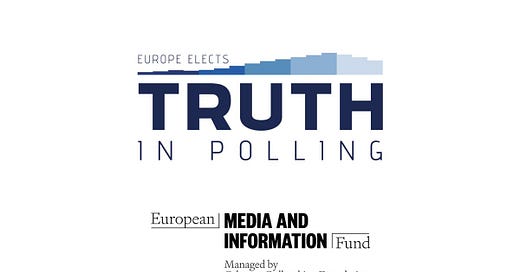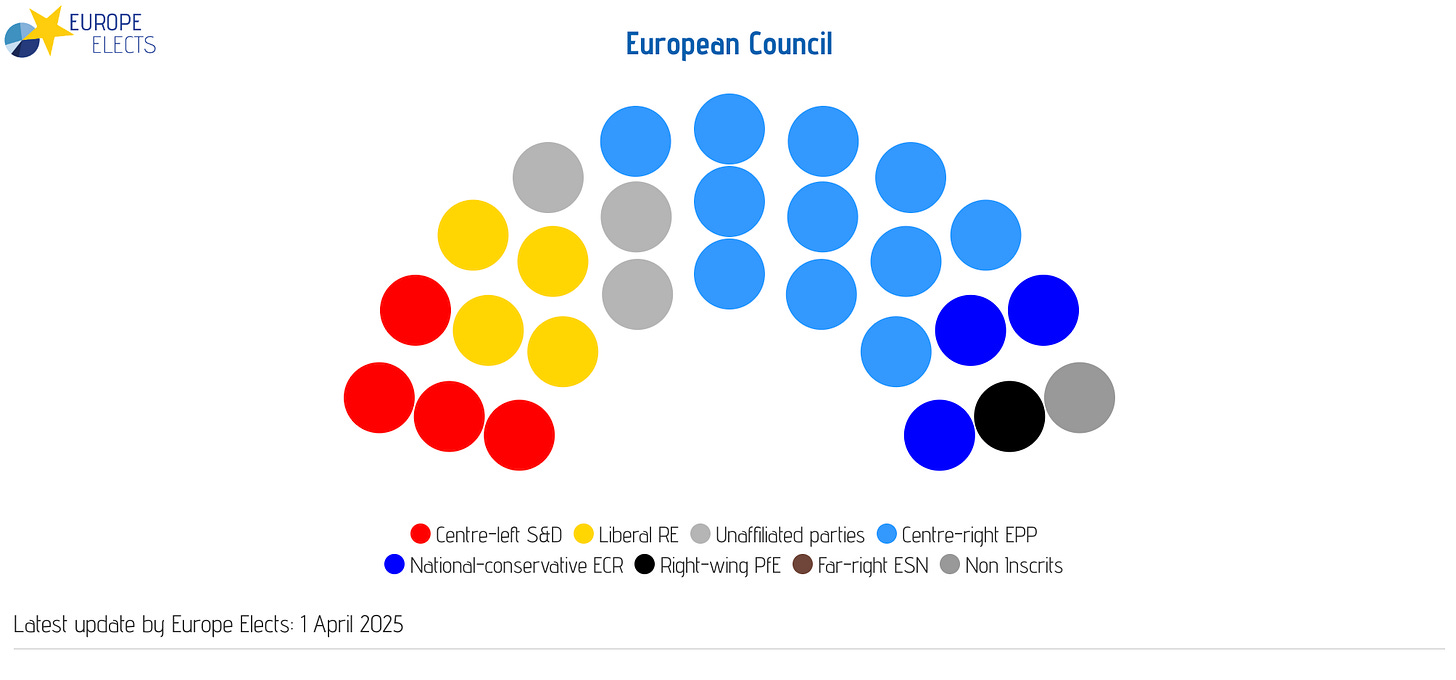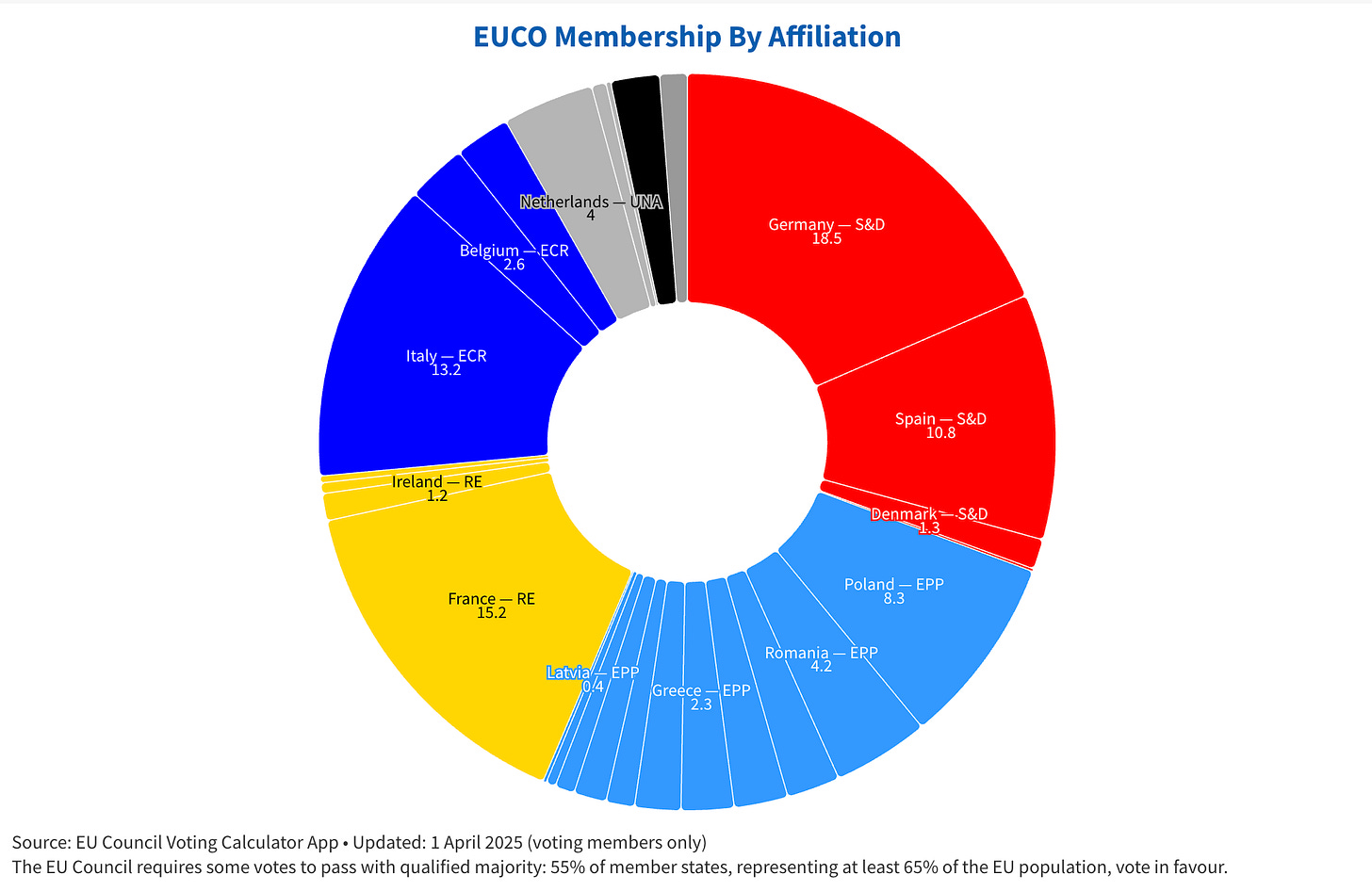This edition will cover both February and March, but we’ll be back to our regular monthly schedule for April. The past two months have seen a number of political earthquakes. But first, if you’d like to encourage others to subscribe, please use this link:
Truth in Polling Project
Europe Elects: Truth in Polling (EETIP) is a publicly available database of pollsters in each European country, assessing essential information related to their activities. With this project, we aim to promote transparency in the polling industry, as well as deepen dialogue with political pollsters in countries of the European Political Community with the goal of reviewing their work collaboratively with them.
This project is supported by the European Media and Information Fund
Learn more here.
All-Elects Fundraiser (2024-2025)
Last year, we as Europe Elects launched a fundraiser to ensure the continuation of our mission: providing accurate and accessible polling data to empower European citizens and support democracy. This year, the stakes are even higher, as we are asking for your support in maintaining not only Europe Elects, but all of our other branches: Africa Elects, America Elects, Asia Elects and Oceania Elects.
Every donation, no matter the size, is an investment in democracy and the future of free, accessible information.
Germany Election Aftermath
February’s parliament election held pretty closely to expectations. The ruling centre-left Social Democratic Party of Germany (SPD-S&D) lost around 40 percent of its seats and dropped to third place, while the centre-right Christian Democratic Union of Germany (CDU-EPP) regained the first-place position it had enjoyed for 16 years under former chancellor Angela Merkle. Party leader Friedrich Merz is now expected to take the reins from Olaf Scholz (SPD), but the exact government configuration is still up in the air. The most likely result seems to be a grand coalition agreement between the CDU and the SPD. The real story of the election was, however, the official arrival of the far-right Alternative for Germany (AfD-ESN) as a major parliamentary player and the complete collapse of the liberal Free Democratic Party (FDP-RE). The AFD almost doubled their seats in the Bundestag and are now the second-largest party in parliament. This is the first time in post-war German history that a party that is not either the CDU or the SPD holds that title. On the flip side, the FDP failed to get into parliament for only the second time ever.
Kosovo Election Aftermath
The centre-left Self-Determination Movement! (LVV-S&D) maintained its first-place position following February’s parliament election, yet saw its seat share shrink by almost 20 percent. Almost two months later, though, negotiations are still ongoing. LVV will need 13 coalition seats to return to government and, as such, will either need to bring on board one of the major opposition parties — the centre-right Democratic Party of Kosovo (PDK-RE) or the centre-right Democratic League of Kosovo (LDK-EPP) — or a hodgepodge of single-seat minority parties. Neither option is particularly easy. LDK has said it won’t work with LVV, and even if LVV was able to bring on board every other single minority party, it would still be two seats short and would need support from the right-wing Serb List (LS~EPP) with whom (to put it nicely) it has a tense relationship.
Liechtenstein Election Aftermath
Not a lot of news comes out of tiny Liechtenstein, but February’s election was notable as it seems like the micro-state will now get its first-ever female prime minister in Brigitte Haas of the centre-right Patriotic Union (VU~RE|EPP).
European Parliament (EP) seats projection
The next European Parliamentary election is still four years away, but in the meantime, we’ll keep updating our predictions. The latest projection can be found here.
EPP: 175 (-13)
S&D: 129 (-7)
PfE: 103 (+19)
ECR: 78 (0)
RE: 85 (+8)
G/EFA: 33 (-20)
LEFT: 55 (+11)
NI: 25 (-8)
ESN: 33 (+8)
Unaffiliated: 4 (+4)
+/- vs. 2024 EU Parliamentary Elections
European Council (EUCO) tracking + Other European Heads of State
Europe Elects does not limit its coverage of EU politics to the European Parliament. Being composed of 27 political leaders from the entire continent, the European Council is an entity shaping the political priorities of the Union.
The Council’s composition changes much more frequently than the Parliament’s—and thanks to our coverage, you can see the timeline of those dynamic shifts at any moment here.
Below, you can see the European Council's current composition, as well as its membership weighted by population.
Notable Updates
Austria: 155 days after the elections in September 2024, President Alexander Van der Bellen (*) swore in Christian Stocker (ÖVP-EPP) as new chancellor. He leads a government of centre-right Austrian People’s Party (ÖVP-EPP), centre-left Social Democratic Party of Austria (SPÖ-S&D) and liberal NEOS – The New Austria (NEOS-RE), with 110 seats out of the 150 seats in the lower house of parliament.
Belgium: 239 days after the elections in June 2024, King Philippe has sworn in Bart De Wever (N VA-ECR) as new prime minister. He leads a government of Flemish regionalist New Flemish Alliance (N VA-ECR), liberal Reformist Movement (MR-RE), centrist The Committed (LE-RE), centre-left Forward (Vooruit-S&D), and the centre-right Christian Democratic and Flemish party (CD&V-EPP), with 82 seats out of the 150 seats in the lower house of parliament.
Estonia: the centre-left Social Democratic Party (SDE-S&D) has been removed from the governing coalition of the liberal Reform Party (RE-RE) and the liberal Estonia 200 (E200→EPP). With the Social Democratic Party removed, the coalition has 52/101 MPs.
France: the former leader of right-wing National Rally (RN-PfE), Marine Le Pen was found guilty of embezzlement after a decade-long investigation and multi-year trial on 31 March. While it is likely Le Pen will appeal her 4-year prison sentence and €100,000 fine (thus delaying the implementation of both), she cannot postpone her 5-year ban from running for public office. This very likely kills any chance for Le Pen’s fourth attempt for the French Presidency, which is up for election in 2027. Le Pen — who led RN for a decade — is largely credited with mainstreaming the party, which was founded by her holocaust-denying, islamophobic, and alleged war criminal father, Jean-Marie Le Pen.
Portugal: President Marcelo Rebelo de Sousa (*-EPP) announced the dissolution of the Assembly of the Republic in March. This followed the rejection of a motion of confidence by Parliament on Tuesday, leading to the resignation of Prime Minister Luís Montenegro (PSD-EPP) and his minority government coalition of the centre-right Social Democratic Party (PSD-EPP) and centre-right CDS-People’s Party (CDS-PP – EPP). A snap election, the third in three-and-a-half years, will take place on 18 May 2025.
Romania: in March, the central electoral bureau rejected the candidacy of Călin Georgescu(*) in the rerun of Romania’s 2024 presidential elections. Georgescu(*) then challenged the ruling in the Constitutional Court, but the court rejected his appeal. The bureau cited the constitutional court annulment of the November election and ruled that Georgescu's candidacy doesn't meet the conditions of legality, breaching the obligation to defend democracy through fair, honest, and impartial elections. According to Europe Elects polling averages, Georgescu(*) was projected to win a plurality of votes in the first round of the presidential elections.
Serbia: the centre-right Serbian Progressive Party (SNS-EPP) of President Aleksandar Vučić (SNS) has until 18 April to form a new government or else the country will face snap elections. Vučić has said that he would call early elections if the country’s parliament couldn’t come up with a new government within 30 days of Prime Minister Miloš Vučević’s (SNS) resignation, which was accepted 19 March. The country is dealing with the probably largest protest movement in its post-Milošević history. Hundreds of thousands have taken to the streets since last November to protest the country’s autocratization and alleged government corruption related to the 2024 Novi Sad railway station canopy collapse that killed 16.
Turkey: the detained (and currently suspended) Mayor of Istanbul Ekrem İmamoğlu (CHP-S&D) has been chosen as the presidential candidate of Republican People’s Party (CHP-S&D) after winning the primary as the sole candidate. Party leader Özgür Özel announced that approximately 1,653,000 party members voted for İmamoğlu, in addition to 13,211,000 non-member “solidarity votes.” This comes after İmamoğlu was detained on various charges put forward by the Istanbul Chief Public Prosecutor’s Office. Around 100 people were also detained, including two Istanbul district mayors of from the CHP. İmamoğlu has been suspended from his job as Mayor of Istanbul by the Ministry of Interior and his university degree has been canceled by Istanbul University, making him technically ineligble to run for President. The Mayor of Beylikdüzü has been suspended as well, while the Mayor of Şişli has been replaced with the District Governor of Şişli. Mass protests against İmamoğlu’s detention, and the increasingly authoritarian rule of President Erdoğan and his Justice and Development Party (AKP ~ NI), are ongoing.
Electoral Calendar 2025/2026
Do you want to be sure not to miss any major election coming up?
Europe Elects doesn’t want you to either! Check out our publicly available electoral calendar for the upcoming year.
https://europeelects.eu/calendar/
Some Upcoming elections
Finland (Regional Parliaments): 13 April
Austria (Vienna Regional Parliament) 27 April
Polling Highlights
Want to stay informed about any polls published across the continent? Check out Europe Elects' Polling average to keep up with all the latest polls.
Croatia: in the latest Promocija plus poll the center-left Social Democratic Party (SDP-S&D) is polling at 31% and securing the first place. This is the party’s highest polling result since 2020. If repeated in a national parliament election, this would be the party's best result since 2016. SDP-led coalition received 25.4% in the 2024 national parliament election.
Czechia: the Czech Pirate Party (Piráti-Greens/EFA) reached a record low with 4.8% in the latest NMS poll — the lowest polling result obtained by the party since 2017. If repeated in the next national parliament election, this would be the party’s worst result since the 2013 election, and the party would lose its parliamentary representation. Meanwhile, Andrej Babiš's centrist Yes 2011 (ANO 2011-PfE) reaches an all-time high in our polling average at 36%. The coalition government of the national-conservative Civic Democratic Party (ODS-ECR), centre-right Mayors and Independents (STAN-EPP), centre-right Christian and Democratic Union – Czechoslovak People’s Party (KDU/ČSL-EPP), and centre-right Tradition Responsibility Prosperity (TOP09-EPP) polls at a combined 31%.
Estonia: the liberal Estonia 200 (E200→EPP) reaches a record low with 1.4% in the latest Norstat poll—the lowest polling result ever obtained by the party. If repeated in the next national parliament election, this would be the party’s worst result ever. In terms of Estonia’s political environment, within the last year, national conservative Isamaa (I-EPP) has surged to first place in our polling average and currently polls at 28%. The governing coalition, comprised of the liberal Estonian Reform Party (RE-RE), liberal Estonia 200 (E200→EPP), and centre-left Social Democratic Party (SDE-S&D), has fallen to a combined 34%, down from 54% at the last national parliament election.
Greece: Course of Freedom (PE-NI) reaches an all-time record high with 9.1% in the latest Interview poll. If repeated in an election, it would be the party’s highest result since it was founded in 2016 by former parliament speaker Zoe Konstantopoulou. Earlier this month, the far-right Voice of Reason (FL-PfE) reached an all-time record high of 8.0% in an MRB poll. The party was established in 2023 by Afroditi Latinopoulou and received 0.4% in the June 2023 election. In June 2024, the party gained representation in the European Parliament with 3%.
Malta: new centrist Momentum (M-*) appears in a poll for the first time, with 4% in the latest MaltaToday poll. The party was launched last month and is led by former Democratic Alternative – Democratic Party (AD-Greens/EFA) leader and independent politician Arnold Cassola.
Moldova: the Alternative Bloc (BA~S&D) political alliance appears in the poll for the first time, with 11.6% in the latest Intellect Group poll. The creation of the BA was announced last month as consisting of former presidential candidate Stoianoglo (supported by PSRM~LEFT but now independent) and three parties: National Alternative Movement (MAN~S&D), Joint Action Party – Civic Congress (PCC-*) and Party of Development and Consolidation of Moldova (PDCM-*). Meanwhile, the Republican Party “The Heart of Moldova”(PRIM-*) reached a record high of 5.3% in the latest IMAS poll after first appearing in a poll 2 months ago (with 1.3%). The party was created in November 2024 by Irina Vlah, the former Governor of the autonomous region of Gagauzia and former presidential candidate.
Portugal: liberal Liberal Initiative (IL-RE) reaches a new record high of 10.7% in the latest Intercampus poll. The party achieved 5.2% of the vote in the 2024 national parliament election.
Slovenia: Janez Janša's centre-right to right-wing Slovenian Democratic Party (SDS-EPP) maintains a clear lead in our polling average with 34%. Robert Golob's governing liberal Freedom Movement (GS-RE) is down to 20%, while the governing coalition polls at 38%.
Sweden: the centre-left Social Democratic Party (S-S&D) maintains a clear lead in our polling average at 34%. The centre-right Moderate Coalition Party (M-EPP) of Prime Minister Ulf Kristersson polls at 19%, neck and neck with national-conservative Sweden Democrats (SD-ECR).
United Kingdom: Nigel Farage's right-wing Reform UK (REFORM~NI) has reached 29% in the most recent Find Out Now poll. This is the party's best poll result since it was founded as the Brexit Party in 2019.
Latest Podcast and Articles
We love feedback
Let us know how we’re doing or if you have any suggestions for how we can improve the newsletter.
Corrections: An earlier version incorrectly stated that the German Christian Democratic Union of Germany (CDU-EPP) was the largest party for 12 years under Angela Merkle instead of the correct number of 16 years. An earlier version also incorrectly stated that the most likely coalition outcome in Germany was the CDU, SPD, and Greens rather than the actual most likely outcome, which is a grand coalition of the CDU and SPD. In the section regarding Serbia, the term authoritization was used instead of the correct term, autocratization, which has now been corrected. We regret the mistakes.









Your Germany coverage has some mistakes, sadly. CDU & SPD are forming goverment alone, without the Greens. Also Merkel was Chancellor for 16 not 12 years.